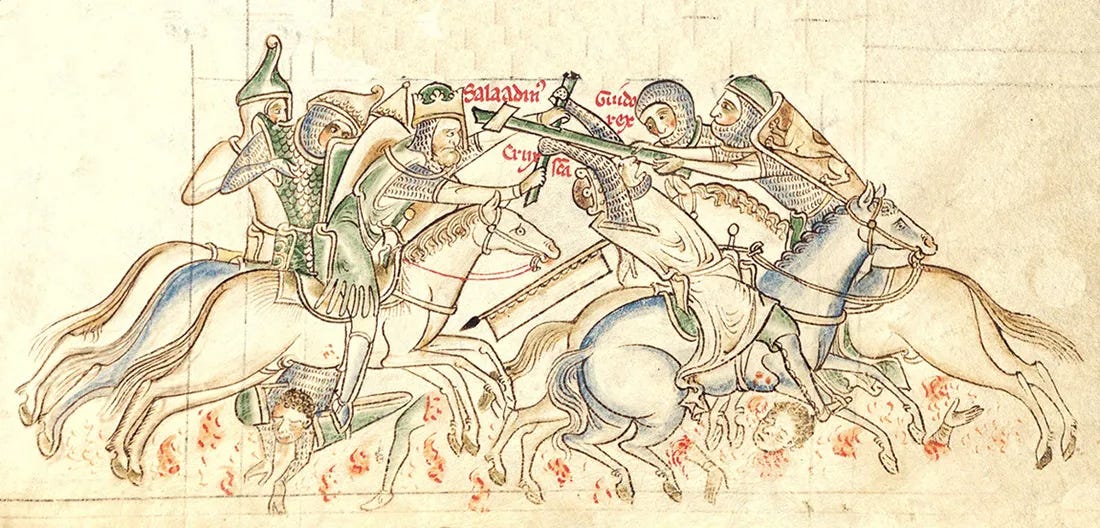Today in History: July 3-6
The Union wins the Battle of Gettysburg, the Nigerian Civil War begins, and more
If you’re interested in history and foreign affairs, Foreign Exchanges is the newsletter for you! Sign up for free today for regular updates on international news and US foreign policy, delivered straight to your email inbox, or subscribe and unlock the full FX experience:
PROGRAMMING UPDATE: As I hope you all know, Foreign Exchanges is on a break that is scheduled to end on July 18. I hope you’re all doing well, and look forward to resuming our regular programming in a couple of weeks. Thanks for reading!
July 3, 1863: The Union Army of the Potomac defeats the Confederate Army of Northern Virginia at the Battle of Gettysburg. Their defeat ended a brief Confederate invasion of the north and, combined with the Union victory at Vicksburg, Mississippi, a day later, is often considered the turning point of the US Civil War.
July 3, 1866: The Battle of Königgrätz, the key engagement in the Austro-Prussian War, ends with a decisive Prussian victory. The war ended a few weeks later and established Prussia as the dominant German state. This paved the way for German unification under Prussian auspices.
July 3, 2013: A military coup overthrows the Egyptian government of Mohamed Morsi, ending a brief experiment in democracy and returning Egypt to military rule.
July 4, 1187: The Battle of Hattin, arguably the greatest disaster of the entire Crusading enterprise, sees the army of Jerusalem under King Guy of Lusignan virtually annihilated by the Ayyubid army under Saladin. Guy, in his regal wisdom, allowed Saladin to draw him a) out of Jerusalem and b) away from water, two decisions that proved to be fatal to most of the men under his command. The decimation of Jerusalem’s army left the city vulnerable and Saladin besieged it in mid-September. After a surprisingly robust defense led by noble Balian of Ibelin, the city fell to Saladin’s forces in early October.

July 4, 1776: The “Declaration of Independence” is published in Britain’s North American colonies. Commemorated annually as Independence Day in the United States.
July 5, 1811: Venezuelan Independence Day, marking the adoption of Venezuela’s Declaration of Independence in a congress of colonial provinces.
July 5, 1960: Several Force Publique military units mutiny against their Belgian officers in the Republic of the Congo-Léopoldville (today the Democratic Republic of the Congo), sparking what has come to be known as the “Congo Crisis.” The Belgian military sent soldiers into Congo-Léopoldville and several parts of the country rebelled. Prime Minister Patrice Lumumba appealed to the Soviet Union for assistance, but army chief of staff Mobutu Sese Seko ousted Lumumba in a coup in September and the country began to break apart. The Crisis ended in November 1965, after most of the rebellions had been suppressed and Mobutu, with US support, had ousted President Joseph Kasa-Vubu in a second coup and assumed absolute power.
July 5, 1962: Algeria declares its official independence from France, a few months after the close of the Algerian War. Independence Day in Algeria.
July 5, 1977: Pakistan’s civilian government, under Prime Minister Zulfikar Ali Bhutto, is overthrown in a military coup led by General Zia-ul-Haq. Zia ruled Pakistan as president/dictator until he died in 1988.
July 6, 640: An Arab army commanded by Amr ibn al-ʿAs defeats a much larger Byzantine force under the command of a general named Theodore in the Battle of Heliopolis. Amr was the driving force behind the decision to invade Egypt, having convinced Caliph Umar I to let him take a small (around 4000 men) force into the region, possibly on a raid rather than a mission of conquest. Umar subsequently reinforced that army and made it possible to think in terms of permanently seizing territory. The Byzantines, still reeling from losing the Levant to the Arabs, were able to muster an army of around 20,000 men to drive the Arabs out of Egypt, but Theodore made the peculiar decision to pick a battle in the open field in which the Arabs’ superior maneuverability and generalship carried the day and left all of Egypt open to Arab conquest. The loss of Egypt was even more devastating to the Byzantines than the loss of the Levant had been.
July 6, 1917: An Arab army under Bedouin chieftain named Auda Abu Tayi and advised by British officer T. E. Lawrence defeats the Ottomans at the Battle of Aqaba. Coming in the wake of an Arab defeat at Medina, the battle was important for several reasons—it helped the Arab Revolt regain momentum, it opened an important Red Sea port to Britain, it cleared the Egyptian Expeditionary Force’s path north, and it allowed the EEF and the Arabs to link up and coordinate their actions moving forward.
July 6, 1967: The Nigerian Civil War begins when Nigerian forces invade the breakaway Niger Delta region of Biafra. The conflict eventually settled into a Nigerian blockade of Biafra, precipitating a massive humanitarian crisis in which hundreds of thousands of people (high estimates run to around 3 million) died of preventable causes, mostly starvation. A final Nigerian assault in December 1969 led to the Biafran rebels’ surrender a month later.

